Untitled Document
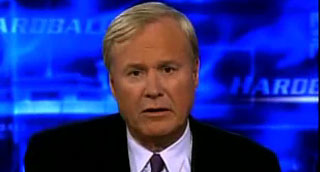
Conservatives dominate on Hardball
Summary: A Media Matters study of guests on MSNBC's Hardball with Chris
Matthews shows that Republican and conservative guests have dominated Hardball
during the first two months of 2006.
Since its CNBC debut as Politics with Chris Matthews in 1996*, MSNBC's
long-running Hardball with Chris Matthews has consistently attracted
criticism from the right wing. For example, in January 2006, Don Irvine, chairman
of the conservative Accuracy in Media, described
Matthews as "[o]ne member of the liberal media"; in April 2005, L.
Brent Bozell III, founder and president of the conservative Media Research Center,
suggested
that Matthews rename Hardball to Cuddles with Chris for the show's
"liberal or radical guests."
Notwithstanding Matthews's Democratic roots (former speechwriter to President
Jimmy Carter, aide to several Democratic members of Congress), during a 2003
episode of Hardball, Matthews told Republican pollster Frank Luntz,
"I'm more conservative than people think I am. ... By the way, I voted
for [President George W.] Bush. ... I like to surprise people." Matthews's
praise for Bush has at times been effusive; in 2005, he said that Bush "glimmers"
with a "kind of sunny nobility"; that "[e]verybody
sort of likes the president, except for the real whack-jobs"; and that,
if he succeeds in creating a democracy in Iraq, Bush "belongs
on Mount Rushmore."
In December 2005, after documenting dozens of examples of Matthews proffering
conservative misinformation on Hardball, Media Matters for America
crowned him "Misinformer
of the Year" -- succeeding Fox News Channel host Bill O'Reilly. And
as this brief study documents, the views expressed on Hardball are
"more conservative than people think": Republican/conservative guests
have dominated Hardball panels since 2006 began.
In February 2006, Media Matters released "If
It's Sunday, It's Conservative," a study of guest appearances on the
Sunday-morning talk shows on ABC, CBS, and NBC. The methodology used in the
study identified each guest's general partisan or ideological orientation, rather
than the substance of their comments on a particular show. Every guest on the
three Sunday shows was coded as Democrat, Republican, conservative, progressive,
or neutral (nonpartisan, centrist, or having no political orientation).
Employing the same methodology, Media Matters tallied all guests who
appeared on Hardball during the first two months of 2006 and coded them based
on party affiliation and ideology. (A list of the guests is here.)
The data reflected in these charts show that the number of Republican/conservative
guests has been significantly higher than the number of Democratic/progressive
guests. In January, Republicans/conservatives led Democrats/progressives 55
to 38 -- a difference of 59 percent to 41 percent. By February, that advantage
had increased: Republican/conservatives outnumbered Democrats/progressives 55
to 34, or 62 percent to 38 percent.
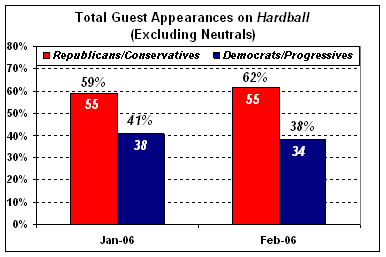
Not only did the right dominate the left overall, but Republicans/conservatives
also outnumbered Democrats/progressives in other key categories. During January
and February, there were more Republican Party elected officials and Bush administration
officials than those from the Democratic Party. In this category, Republicans
outnumbered Democrats 22 to 18.
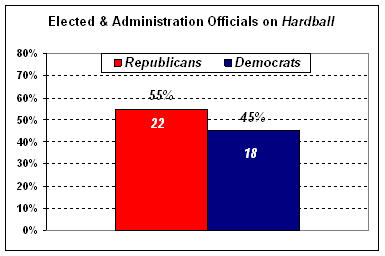
In addition, conservative journalists and pundits outnumbered progressive journalists
and pundits by a considerable margin. While most journalists/pundits were neutral
reporters or consistently presented a centrist point of view, the data show that
those who spoke from an ideological perspective were conservative far more often
than progressive. Conservatives in this category outnumbered progressives 42 to
13 -- a ratio of more than 3-to-1.
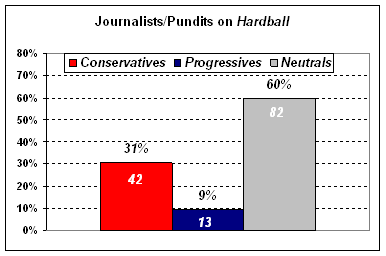
Another area in which the right dominated on Hardball was the coveted
solo interview. During January and February, Hardball featured 24 solo
interviews with Democrats/progressives, while Republicans/conservatives had
nearly twice as many: 44 solo interviews. In addition, eight of the twelve guests
who were given the honor of multiple solo interviews during this time period
were Republican officials. Only one Democrat, Sen. Joseph R. Biden Jr. (D-DE),
appeared in multiple solo interviews. The other centrist/neutral guests who
were given multiple solo interviews on Hardball were Dick Sauber, attorney
for Time magazine White House correspondent Matthew Cooper; Charlie Cook of
The Cook Political Report; and New York Times reporter James
Risen.
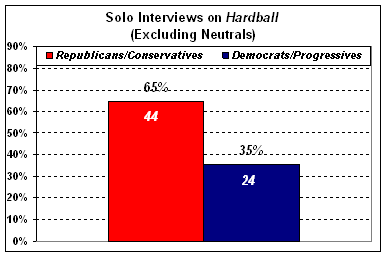
Hardball panels frequently demonstrate an ideological imbalance; when
they do, that imbalance usually tilts to the right. While the majority of panels
were balanced, the number of right-tilted panels was significantly greater than
the number of left-tilted panels, at a ratio of nearly 3-to-1. During January
and February, 22 panels tilted right, while only eight panels tilted left. This
can largely be attributed to the presence of frequent panelists -- and conservative
MSNBC hosts -- Tucker Carlson of The Situation with Tucker Carlson
and former Rep. Joe Scarborough (R-FL) of Scarborough Country. Both
MSNBC hosts are given prominence on Hardball's journalist panels without
a progressive to counter with an opposing point of view.
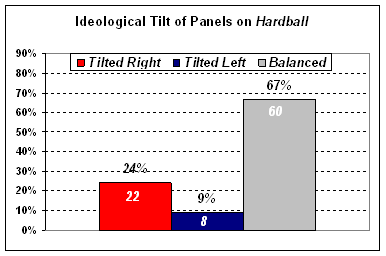
On January 20, Matthews premiered a "special new feature," dubbed
"Hardball Hot Shots." The "hot shots" are three
MSNBC hosts: Carlson, Scarborough, and Rita Cosby, host of Rita Cosby Live
& Direct. Matthews described the now-weekly "Hot Shots" as
follows: "We'll nail the winners and the losers, the heroes and the villains,
the brilliant and the buffoonery from the past week." Two of the three
panelists -- Carlson and Scarborough -- are avowedly conservative; the third,
Cosby, evinces no particular partisan or ideological affiliation. The composition
of the three-member "Hot Shots" panel ensures that it remains a forum
for conservative opinions -- with no identifiably progressive counterpoint.
Every weeknight, Matthews tells an audience
of 330,000 Americans "what
I really think." But is he really playing Hardball? Some might
argue that a show whose host once worked for Democrats should feature more Republican
and conservative guests. But as Media Matters has shown here and in
numerous
previous items, Chris Matthews is hardly a progressive -- indeed, there
are few television hosts more enthusiastic in their support of President Bush.
The dominance of Republicans and conservative guests on Hardball is
certainly in the interest of conservatives, the Republican Party, and the Bush
administration; it's not, however, in the public interest.
* According to a September 1999 article in the now-defunct Brill's Content,
titled "Chris
Matthews Won't Shut Up," Matthews began his career as a TV pundit in
1991 doing political commentary for ABC's Good Morning America. In
1994, Roger Ailes -- currently chairman of the board, CEO, and president of
Fox News -- hired Matthews for a show called In Depth on NBC's newly
launched cable network America's Talking. In 1996, MSNBC took over America's
Talking, and Ailes moved Matthews to CNBC to host Politics with Chris Matthews.
In 1997, the program moved to MSNBC and was renamed Hardball with Chris
Matthews.
List of
Hardball guests in January and February 2006

